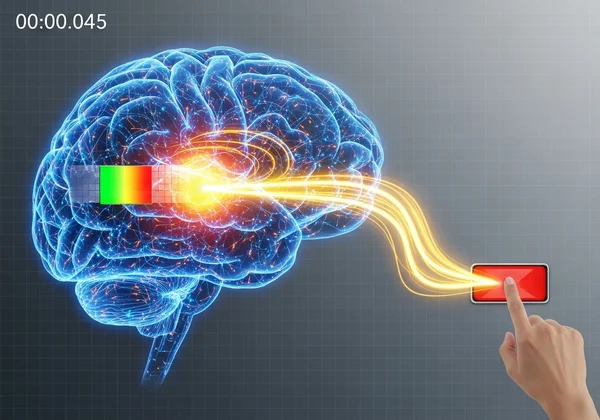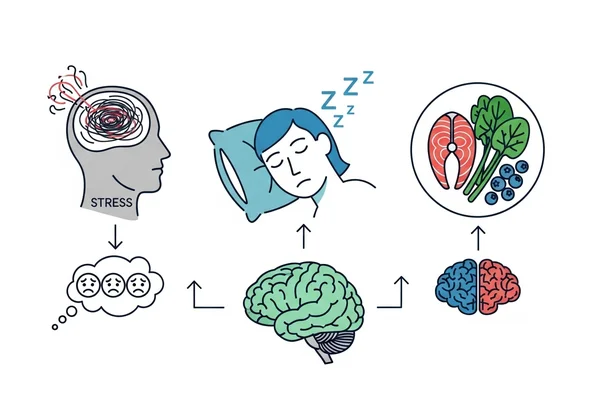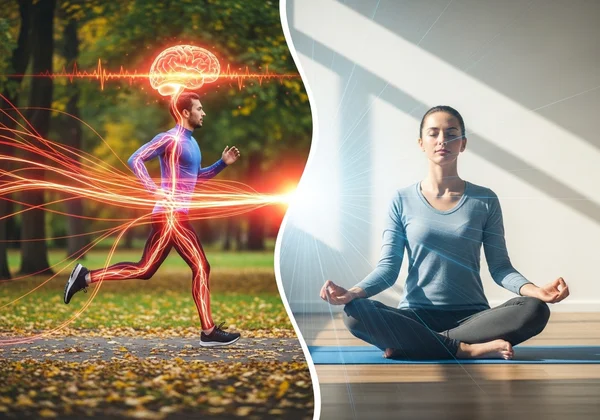زمان واکنش خود را بهبود بخشید: راهنمای جامع تست سرعت واکنش انسانی و سلامت مغز
October 8, 2025 | By Marcus Adler
مقدمه: زبان خاموش مغز شما: چرا زمان واکنش بیش از آنچه فکر میکنید اهمیت دارد
تا به حال به سرعت افکارتان فکر کردهاید؟ این یک فرآیند خاموش است که بارها در طول روز اتفاق میافتد، از گرفتن یک لیوان در حال افتادن گرفته تا فشردن ترمز در ترافیک. این واکنش در کسری از ثانیه، معروف به زمان واکنش، چیزی بیش از اندازهگیری رفلکسهای سریع است - بلکه بینشی جذاب به سلامت کلی مغز شماست. همانطور که ما نسبت به سلامت شناختی خود آگاهتر میشویم، بسیاری از ما میپرسیم، زمان واکنش خوب چیست؟ پاسخ به این سوال، اطلاعات زیادی در مورد عملکرد عصبی ما آشکار میکند. نظارت بر نتایج آزمون زمان واکنش شما در طول زمان، یکی از سادهترین و در عین حال بصیرتبخشترین راهها برای پیگیری عملکرد شناختی و سلامت مغز شماست. این عدد، مقیاسی ملموس برای فرآیندی نامرئی است. آمادهاید ببینید امتیاز شما چه میگوید؟ با یک تست سریع و ساده میتوانید همین حالا خط پایه خود را بسنجید.

زمان واکنش و پیری: چه چیزهایی با افزایش سن تغییر میکنند؟
این مشاهده رایج است که تواناییهای فیزیکی ما با افزایش سن تغییر میکنند و عملکردهای شناختی ما نیز تفاوتی ندارند. ارتباط بین زمان واکنش و پیری به خوبی مستند شده است، اما درک "چرا" پشت آن میتواند ما را قادر سازد تا گامهای پیشگیرانهای برای حفظ هوشیاری ذهنی خود برداریم. این موضوع مربوط به زوال نیست؛ بلکه مربوط به آگاهی و سازگاری است.
تغییرات شناختی: کند شدن طبیعی: درک تغییرات شناختی مرتبط با سن
با افزایش سن، شبکه پیچیده نورونها در مغز ما تغییرات ظریفی را تجربه میکند. غلاف میلین که فیبرهای عصبی را پوشش میدهد، ممکن است نازک شود و تولید انتقالدهندههای عصبی کاهش یابد. این مانند شبکه برق یک شهر است که قدیمیتر میشود؛ سیگنالها هنوز منتقل میشوند، اما ممکن است کسری از ثانیه کندتر سفر کنند. این منجر به افزایش طبیعی زمان لازم برای درک محرک توسط مغز شما (مانند تبدیل شدن یک مربع قرمز به سبز)، پردازش اطلاعات و ارسال سیگنال به عضلات شما برای اقدام (کلیک کردن روی ماوس) میشود. این بخشی طبیعی از فرآیند پیری است که منعکس کننده یک عمر تجربه و مغزی است که صرفاً مدت زمان بیشتری فعال بوده است.
وظایف شناختی روزانه: تأثیر بر زندگی روزمره: چگونه واکنشهای کندتر بر روال شما تأثیر میگذارند
در حالی که چند میلیثانیه اضافی ممکن است ناچیز به نظر برسد، اما میتواند تأثیر قابل توجهی بر فعالیتهای روزانه داشته باشد. برای یک راننده، این میتواند تفاوت مسافت ترمز مورد نیاز برای جلوگیری از تصادف باشد. در آشپزخانه، ممکن است تفاوت بین گرفتن یک وسیله افتاده یا تمیز کردن یک آشفتگی باشد. برای ورزشکاران، این برتری در یک بازی رقابتی است. آگاهی از این تغییرات به ما امکان سازگاری میدهد. این امر منجر به عادات رانندگی ایمنتر، حرکات آگاهانهتر و قدردانی بیشتر از قدرت پردازش شگفتانگیزی که هر لحظه به آن تکیه میکنیم، میشود. آیا کنجکاوید در مورد سرعت فعلی خود بدانید؟ یک آزمون سرعت واکنش ساده آزمون سرعت واکنش میتواند بینش ارزشمندی ارائه دهد.

علائم خستگی ذهنی: فراتر از سن: خستگی ذهنی، سبک زندگی و سرعت واکنش شما
سن تنها یک قطعه از پازل است. زمان واکنش شما یک شاخص پویا است که به شدت تحت تأثیر عادات روزانه و سلامت کلی شما قرار دارد. به آن به عنوان گزارش عملکرد روزانه مغزتان فکر کنید. خستگی ذهنی، استرس و انتخابهای سبک زندگی اغلب مقصران اصلی کاهش ناگهانی سرعت واکنش شما، صرف نظر از سن شما هستند.
عوامل سبک زندگی: خرابکاران خاموش: نقش استرس، خواب و تغذیه
مغز ما به شدت به محیط داخلی و خارجی خود حساس است. استرس مزمن بدن را سرشار از کورتیزول میکند، هورمونی که میتواند عملکرد شناختی را مختل کرده و ارتباطات عصبی را کند کند. کمبود خواب شبانه شاید فوریترین خرابکار باشد؛ بدون استراحت کافی، مغز نمیتواند به طور موثر مواد زائد متابولیک را پاک کند و منجر به مه ذهنی و واکنشهای کند میشود. به طور مشابه، تغذیه نقش حیاتی ایفا میکند. رژیم غذایی فاقد اسیدهای چرب امگا 3، آنتیاکسیدانها و ویتامینهای B میتواند مغز شما را از سوختی که برای پردازش با سرعت بالا نیاز دارد، محروم کند. حفظ آب بدن نیز کلیدی است، زیرا حتی کمآبی خفیف میتواند منجر به افت قابل اندازهگیری در عملکرد شناختی شود.

دقت آزمون: تأخیر دستگاه و عوامل محیطی: تجربه آزمون
از منظر روانشناختی، هنگام انجام آزمون آنلاین مهم است که متغیرهای خارجی را در نظر بگیرید. امتیاز شما فقط اندازهگیری سرعت مغز شما نیست؛ بلکه اندازهگیری کل سیستم است. این شامل قدرت پردازش کامپیوتر شما، نرخ تازهسازی مانیتور شما (تأخیر) و حتی زمان پاسخدهی ماوس شما میشود. یک دستگاه کندتر میتواند میلیثانیهها به امتیاز شما اضافه کند. عوامل حواسپرتی محیطی، مانند صدا یا حرکت در دید محیطی شما، نیز میتوانند توجه شما را تقسیم کرده و پاسخ شما را به تأخیر بیندازند. برای حصول بهترین و پایدارترین نتایج، بهتر است هر بار خود را در شرایط مشابه آزمایش کنید - با استفاده از همان دستگاه در یک فضای آرام. این به اطمینان از اینکه تغییرات را در عملکرد خودتان، نه عملکرد دستگاه، پیگیری میکنید، کمک میکند.
سیستم هشدار اولیه مغز شما: کندیها چه چیزی را ممکن است نشان دهند
مشاهده نمرات آزمون زمان واکنش شما به عنوان یک آزمون عملکرد شناختی میتواند بسیار توانمند کننده باشد. در حالی که این ابزار به هیچ وجه تشخیصی نیست، تغییرات مداوم و قابل توجه در نمرات شما میتواند به عنوان یک "چراغ چک" شخصی عمل کند. این شما را ترغیب میکند تا عمیقتر به سبک زندگی خود نگاه کنید یا در برخی موارد، مشورت با یک متخصص سلامت را در نظر بگیرید.
سرعت پردازش: یک معیار کلیدی برای هوشیاری شناختی
در روانشناسی، سرعت پردازش به عنوان سنگ بنای توانایی شناختی در نظر گرفته میشود. این به سرعتی اشاره دارد که شما میتوانید اطلاعات را دریافت کنید، آنها را درک کنید و شروع به پاسخ دادن کنید. زمان واکنش سریع در یک کار ساده، مانند آنچه در سایت ما وجود دارد، نشان دهنده پردازش مرکزی کارآمد است. این نشان میدهد که مسیرهای حسی، ارزیابی شناختی و خروجی حرکتی شما همگی در هماهنگی کار میکنند. کند شدن مداوم میتواند نشانگر اولیه فشار شناختی باشد، بسیار قبل از اینکه در وظایف پیچیدهتر مانند یادآوری حافظه یا حل مسئله ظاهر شود. زمان واکنش خود را بسنجید به طور منظم تا یک خط پایه شخصی ایجاد کنید.
سیگنالهای سلامتی: چه زمانی با یک متخصص مشورت کنیم: تشخیص سیگنالهای بالقوه سلامتی
این مهمترین نکته است: یک آزمون آنلاین برای بینش و آگاهی شخصی است، نه خودتشخیصی. اگر کاهش مداوم و قابل توجهی در زمان واکنش خود مشاهده کردید، به خصوص اگر با علائم دیگری مانند مشکلات حافظه، گیجی یا تغییرات خلقی همراه باشد، مشورت با پزشک ضروری است. زمان واکنش کند میتواند با شرایط بهداشتی زمینهای مختلف، کمبود ویتامین یا عوارض جانبی داروها مرتبط باشد. از نتایج آزمون خود به عنوان یک شاخص استفاده کنید - اطلاعاتی که بتوانید با متخصص در میان بگذارید تا ارزیابی جامعی دریافت کنید. به این ابزار به عنوان راهی برای شروع مکالمه در مورد سلامتی خود فکر کنید، نه نتیجهگیری آن.
زمان واکنش را بهبود بخشید: گامهای عملی: تقویت سلامت مغز و سرعت واکنش شما
خبر عالی این است که مغز شما ظرفیت قابل توجهی برای تغییر دارد، که به عنوان انعطافپذیری عصبی شناخته میشود. زمان واکنش شما روی سنگ حک نشده است. با اتخاذ عادات سالم برای مغز، میتوانید به طور فعال برای حفظ و حتی بهبود سرعت پردازش عصبی خود در هر سنی تلاش کنید.
فعالیتهای تقویت کننده مغز: ورزش و ذهن آگاهی: تغذیه مغز برای سرعت
ورزش بدنی یکی از مؤثرترین راهها برای تقویت عملکرد شناختی است. فعالیتهای هوازی مانند دویدن، شنا یا پیادهروی سریع جریان خون به مغز را افزایش میدهند و اکسیژن و مواد مغذی حیاتی را میرسانند. همچنین باعث آزادسازی فاکتور نوروتروفیک مشتق از مغز (BDNF)، پروتئینی که از رشد و بقای نورونها حمایت میکند، میشود. از سوی دیگر، تمرینات ذهن آگاهی و مدیتیشن توجه و تمرکز شما را آموزش میدهند. با یادگیری خاموش کردن "نویز" ذهنی، میتوانید توانایی خود را برای تمرکز بر یک محرک واحد، که اساس یک واکنش سریع است، بهبود بخشید.

آموزش شناختی: بازیها و تمرینات آموزشی شناختی فراتر از آزمون کلیک
در حالی که آزمون زمان واکنش ما ابزار عالی برای اندازهگیری و تمرین متمرکز است، طیف وسیعی از فعالیتها میتوانند به تیز نگه داشتن ذهن شما کمک کنند. تجربه چیزهای جدید کلیدی است - یادگیری یک مهارت جدید، نواختن ساز موسیقی، یا امتحان کردن بازیهای استراتژیک مانند شطرنج، همگی مسیرهای عصبی جدیدی را ایجاد میکنند. بازیهای ویدیویی، به ویژه بازیهای اکشن سریع، نشان دادهاند که سرعت پردازش و کنترل توجه را بهبود میبخشند. هدف این است که مغز خود را به روشهای مختلف به چالش بکشید، آن را انعطافپذیر، مقاوم و سریع نگه دارید. آماده شروع آموزش خود هستید؟ همین الان رفلکسهای خود را آزمایش کنید و ببینید در چه وضعیتی هستید.
بینشها را باز کنید: سرعت مغز خود را امروز آزمایش کنید
زمان واکنش شما یک معیار قدرتمند و شخصی است. این یک عدد ساده است که داستانی پیچیده در مورد سلامت شناختی شما، تأثیر سبک زندگی شما و سرعت شگفتانگیز سیگنالهای عصبی که هر عمل شما را هدایت میکنند، بیان میکند. با درک و پیگیری این علامت حیاتی، شما از یک مسافر منفعل به یک راننده فعال سلامت شناختی خود تبدیل میشوید.
فقط در مورد عملکرد مغزتان کنجکاو نباشید - آن را اندازه بگیرید. صرف لحظهای برای آزمایش تایمر واکنش رایگان ما اولین قدم سریع، آسان و بصیرتبخش در سفری به سوی ذهنی تیزتر و سالمتر است. امتیاز شما چه خواهد بود؟
سوالات متداول در مورد زمان واکنش و سلامت مغز
زمان واکنش خوب برای سلامت کلی مغز چیست؟
در حالی که عدد واحد و مشخصی به عنوان "خوب" وجود ندارد، میانگین زمان واکنش برای یک انسان که به یک محرک بصری پاسخ میدهد حدود 250 میلیثانیه (ms) یا یک چهارم ثانیه است. امتیازات بین 200-270 میلیثانیه به طور کلی متوسط در نظر گرفته میشوند. با این حال، مهمترین چیز خط پایه شخصی شماست. امتیاز "خوب" امتیازی است که برای شما سازگار است. انحراف قابل توجه از میانگین خودتان بیشتر از مقایسه خود با دیگران گویا است.
آیا عادات خواب ضعیف میتواند زمان واکنش من را به طور قابل توجهی کند کند؟
قطعا. تحقیقات نشان دادهاند که کمبود خواب میتواند تأثیری مشابه با مستی بر زمان واکنش داشته باشد. تنها یک شب خواب ضعیف میتواند پاسخهای شما را به طور قابل اندازهگیری کند کند. این به این دلیل است که خواب برای عملکرد مغز، از جمله توجه، سرعت پردازش و تصمیمگیری، حیاتی است. پیگیری مداوم امتیاز خود در یک بازی زمان واکنش حتی میتواند تأثیر یک شب خواب بد را برجسته کند.
دلایل رایج کندی مداوم زمان واکنش، به غیر از سن چیست؟
علاوه بر پیری، عوامل متعددی میتوانند به کند شدن واکنشها کمک کنند. اینها شامل استرس مزمن، خستگی ذهنی، تغذیه ضعیف، کمآبی، داروها و سبک زندگی کمتحرک است. اگر کند شدن مداومی را مشاهده کردید، اغلب ایده خوبی است که این حوزههای سبک زندگی را ارزیابی کنید تا ببینید کجا میتوانید تغییرات مثبتی ایجاد کنید.
آیا ممکن است زمان واکنش با افزایش سن بهبود یابد، یا این زوال اجتنابناپذیر است؟
در حالی که کند شدن طبیعی معمول است، زوال شدید اجتنابناپذیر نیست. شما قطعاً میتوانید اقداماتی را برای حفظ و حتی بهبود زمان واکنش خود با افزایش سن انجام دهید. ورزش منظم، درگیر شدن در فعالیتهای محرک ذهنی، تمرین ذهن آگاهی، اطمینان از خواب با کیفیت و داشتن رژیم غذایی سالم، همگی به سلامت بهتر مغز و سرعت پردازش سریعتر کمک میکنند. به آن به عنوان آموزش مغزتان درست مانند هر عضله دیگری فکر کنید. شما میتوانید این آموزش را امروز با ایجاد یک خط پایه با یک آزمون کلیک ساده آغاز کنید.